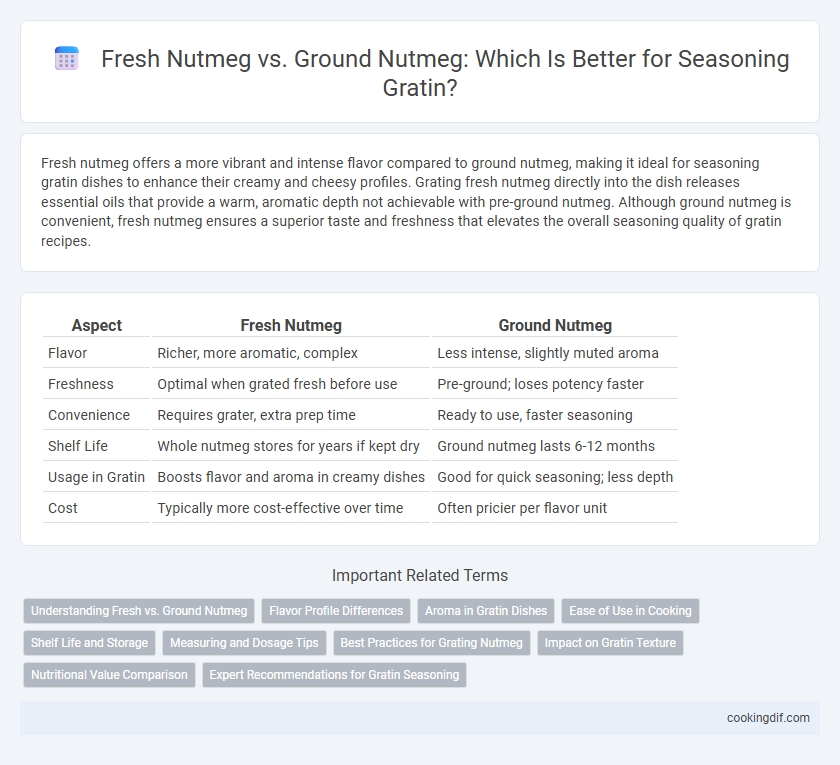Fresh nutmeg offers a more vibrant and intense flavor compared to ground nutmeg, making it ideal for seasoning gratin dishes to enhance their creamy and cheesy profiles. Grating fresh nutmeg directly into the dish releases essential oils that provide a warm, aromatic depth not achievable with pre-ground nutmeg. Although ground nutmeg is convenient, fresh nutmeg ensures a superior taste and freshness that elevates the overall seasoning quality of gratin recipes.
Table of Comparison
| Aspect | Fresh Nutmeg | Ground Nutmeg |
|---|---|---|
| Flavor | Richer, more aromatic, complex | Less intense, slightly muted aroma |
| Freshness | Optimal when grated fresh before use | Pre-ground; loses potency faster |
| Convenience | Requires grater, extra prep time | Ready to use, faster seasoning |
| Shelf Life | Whole nutmeg stores for years if kept dry | Ground nutmeg lasts 6-12 months |
| Usage in Gratin | Boosts flavor and aroma in creamy dishes | Good for quick seasoning; less depth |
| Cost | Typically more cost-effective over time | Often pricier per flavor unit |
Understanding Fresh vs. Ground Nutmeg
Fresh nutmeg offers more vibrant and complex flavors compared to ground nutmeg, as its essential oils remain intact until freshly grated. Ground nutmeg, while convenient, loses some aromatic intensity over time and can develop a slightly bitter taste. For optimal seasoning in gratin dishes, freshly grated nutmeg enhances the creamy texture with a fresher, more potent spice profile.
Flavor Profile Differences
Fresh nutmeg provides a more vibrant and aromatic flavor with warm, slightly sweet, and nutty notes that enhance the creamy textures of gratin. Ground nutmeg, being more concentrated and potent, offers a sharper and more intense spice impact but can lose some of its subtle floral undertones. Using fresh nutmeg in gratin elevates the dish's complexity and freshness, while ground nutmeg delivers convenience and a consistent flavor punch.
Aroma in Gratin Dishes
Fresh nutmeg in gratin dishes offers a vibrant, intense aroma that enhances the rich, creamy layers with its warm, slightly sweet and woody notes. Ground nutmeg, while convenient, tends to lose some of its essential oils over time, resulting in a milder, less pronounced fragrance that may not fully elevate the gratin's flavor profile. Using freshly grated nutmeg ensures a more aromatic and flavorful gratin, amplifying the dish's sensory appeal.
Ease of Use in Cooking
Fresh nutmeg offers a more intense aroma and flavor, enhancing gratin dishes with subtle warmth and complexity. Ground nutmeg provides convenience and consistent seasoning, making it ideal for quick, precise measurements in cooking. Choosing ground nutmeg simplifies preparation without sacrificing the nutmeg's distinctive taste in gratin recipes.
Shelf Life and Storage
Fresh nutmeg has a stronger aroma and flavor but a shorter shelf life, typically lasting up to six months when stored whole in an airtight container away from light and heat. Ground nutmeg, although more convenient, loses potency faster and is best used within three to four months to maintain optimal seasoning quality. Proper storage in a cool, dark place significantly extends the shelf life of both forms, preserving their essential oils and enhancing the flavor of gratin dishes.
Measuring and Dosage Tips
Fresh nutmeg offers a more intense, aromatic flavor compared to ground nutmeg, so use about half the quantity when measuring for seasoning a gratin. Ground nutmeg is more concentrated and consistent, making it easier to dose precisely with a 1:1 measurement for most recipes. For optimal seasoning, grate fresh nutmeg directly over the dish and start with 1/4 teaspoon for a medium-sized gratin, adjusting carefully to avoid overpowering the creamy layers.
Best Practices for Grating Nutmeg
Fresh nutmeg offers a more intense, aromatic flavor compared to ground nutmeg, making it the preferred choice for seasoning gratin dishes. Using a fine microplane or nutmeg grater ensures even, controlled grating, which enhances the dish's flavor without overwhelming it. For best results, grate nutmeg just before adding it to the gratin to preserve essential oils and maintain maximum freshness.
Impact on Gratin Texture
Fresh nutmeg releases essential oils that enhance the creamy texture of a gratin, providing a more aromatic and vibrant flavor compared to ground nutmeg. Ground nutmeg, while convenient, can sometimes create a grainy texture if overused and lacks the potent freshness needed to elevate the dish's overall richness. Using freshly grated nutmeg optimizes the smoothness and depth of seasoning, resulting in a perfectly balanced, velvety gratin.
Nutritional Value Comparison
Fresh nutmeg contains higher levels of essential oils and antioxidants compared to ground nutmeg, enhancing both flavor and nutritional benefits. The volatile compounds in fresh nutmeg contribute to its superior aroma and potential anti-inflammatory properties. Ground nutmeg may lose some potency over time, resulting in reduced nutritional value and a milder taste profile.
Expert Recommendations for Gratin Seasoning
Experts recommend using freshly grated nutmeg over ground nutmeg for gratin seasoning to achieve a more vibrant and aromatic flavor profile. Fresh nutmeg's essential oils remain intact, enhancing the creamy textures and complementing the rich cheese and bechamel sauce in gratin dishes. Ground nutmeg, while convenient, often loses potency and can impart a muted, less complex taste that may diminish the overall depth of the seasoning.
Fresh nutmeg vs ground nutmeg for seasoning Infographic

 cookingdif.com
cookingdif.com